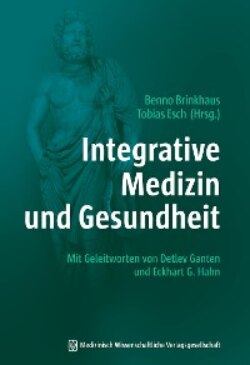Читать книгу Integrative Medizin und Gesundheit - Группа авторов - Страница 74
Literatur
ОглавлениеACIH Academic Collaborative for Integrative Health (2018) Competencies for Optimal Practice in Integrated Environments. ACIH Board of Directors, 1–4
Barr H, Ford J, Gray R, Helme M, Hutchings M, Low H, Machin A, Reeves S (2017) Interprofessional Education Guidelines. CAIPE: Centre for the Advancement of Interprofessional Education
Boon H, Verhoef M, O’Hara D, Findlay B (2004) From parallel practice to integrative health care: a conceptual framework. BMC Health Serv Res 4(1),15
Coulter I (2004) Integration and paradigm clash: the practical difficulties of integrative medicine. In: Tovey P, Easthope G, Adams J (Hrsg.) The mainstreaming of complementary and alternative medicine: Studies in social context. 103–122 Routledge London
D’Amour D, Oandasan I (2005) Interprofessionality as the field of interprofessional practice and interprofessional education: an emerging concept. J Interprof Care 19(1), 8–20
Foley H, Steel A, Cramer H, Wardle J, Adams J (2019) Disclosure of complementary medicine use to medical providers: a systematic review and meta-analysis. Sci Rep 9(1573)
Green BN, Johnson CD (2015) Interprofessional collaboration in research, education, and clinical practice: working together for a better future. J Chiropr Educ 29(1), 1–10
Hollenberg D, Bourgeault IL (2011) Linking integrative medicine with interprofessional education and care initiatives: challenges and opportunities for interprofessional collaboration. J Interprof Care 25(3), 182–188
IPEC Interprofessional Education Collaborative (2011) Core competencies for interprofessional collaborative practice: Report of an expert panel. Washington DC
IPCE Interprofessional Education Collaborative (2016) Core competencies for interprofessional collaborative practice: 2016 Update. Washington DC
Johnson TJ (1972) Professions and power. Studies in sociology. London: Macmillan
Lanzerath D (2000) Der Umgang mit prädiktivem Wissen in der genetischen Diagnostik: ethische Aspekte unter besonderer Berücksichtigung des Krankheitsbegriffs. Berlin Enquête-Kommission „Recht und Ethik der Modernen Medizin“ 14(18)
Reeves S, Boet S, Zierler B, Kitto S (2015) Interprofessional Education and Practice Guide No. 3: Evaluating interprofessional education. J Interprof Care 29(4), 305–312
Reeves S, Zwarenstein M, Goldman J, Barr H, Freeth D, Koppel I, Hammick M (2010) The effectiveness of inter-professional education: key findings from a new systematic review. J Interprof Care 24(3), 230–241
Sackett DL, Rosenberg WMC, Gray JA, Haynes RB, Richardson WS (1996) Evidence based medicine: what it is and what it isn’t. BMJ 312(7023), 71–72
Schot E, Tummers L, Noordegraaf M (2019) Working on working together. A systematic review on how healthcare professionals contribute to interprofessional collaboration. J Interprof Care, 1–11.
WHO World Health Organization (1988) Learning together to work together for health. Report of a WHO Study Group on Multiprofessional Education of Health Personnel: the Team Approach. World Health Organ Tech Rep Ser 769, 1–72
WHO World Health Organization (2010) Framework for Action on Interprofessional Education & Collaborative Practice. Geneva World Health Organization
World health statistics (2018) Monitoring health for the SDGs, sustainable development goals. Licence: CC BY-NC-SA 3.0 IGO. Geneva World Health Organization
Witt CM, Perard M, Berman B, Berman S, Birdsall TC, Defren H, Schweiger D (2015) Using the framework of corporate culture in “mergers” to support the development of a cultural basis for integrative medicine – guidance for building an integrative medicine department or service. Patient Prefer Adherence 9, 113–120
Zwarenstein M, Goldman J, Reeves S (2009) Interprofessional collaboration: effects of practice-based interventions on professional practice and healthcare outcomes. Cochrane Database Syst Rev (3) CD000072
Angelika Homberg, Dipl.-Med.-Päd.
Geboren 1966 in Sinsheim an der Elsenz. Nach Beendigung ihres Medizinpädagogikstudiums an der Charité Berlin arbeitete sie seit 2014 in unterschiedlichen interprofessionellen und innovativen Lehrprojekten an den Medizinischen Fakultäten Heidelberg und Mannheim. Sie ist maßgeblich für die Entwicklung und Implementierung des interprofessionellen komplementär- und integrativmedizinischen Lehrmoduls InterKIM an der Medizinischen Fakultät Heidelberg verantwortlich. Aktuell promoviert sie zum Thema interprofessionelle Curriculumsentwicklung für komplementäre Medizin.
Prof. Dr. med. Claudia M. Witt, MBA
Prof. Dr. med. Claudia M. Witt ist Lehrstuhlinhaberin für komplementäre und integrative Medizin an der Universität Zürich und Direktorin des gleichnamigen Instituts am Universitätsspital Zürich. Als Prodekanin für Interprofessionalität vertritt sie dieses Thema seit 2018 an der Medizinischen Fakultät der Universität Zürich. Seit 2019 ist sie zudem Co-Direktorin der Digital Society Initiative der Universität Zürich und setzt sich für einen interdisziplinären reflektierten Umgang mit der Digitalisierung ein. Seit 2011 forscht sie zu Digital Health Interventions für Mind & Body.
